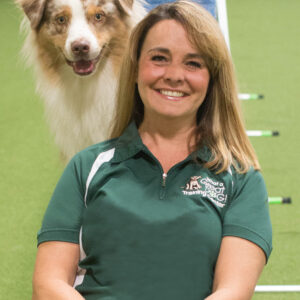As people, especially in this era of instant gratification, we all have a tendency to get frustrated. Our levels of frustration differ based on what we are doing and what we are trying to accomplish. When working with our dogs, we tend to get most frustrated when we believe that the behavior we’re asking for is either easy to perform or well known to the dog.
Sample Scenario: you ask your dog to perform a task, like heel, and he doesn’t, so you get frustrated. You may pull him into position and shorten your leash, to keep him in heel position. Your frustration probably continues to build because, now, there is tension in the leash (being applied by you), causing your dog to have difficulty heeling. This may result in his applying reactionary tension in the leash, causing a vicious cycle. Then you may start to use constant physical manipulation to keep him in the heel position, creating more and more frustration for you both.
What you should do at the first sign of your dog not heeling (assuming that he fully understands heeling and has been able to do it in the context that you are asking of him) is to look at what could possibly be going on to prevent him from accomplishing this seemingly easy task. Is his best buddy ahead? His favorite trainer? A treat on the floor? Needing to get outside to potty? Could you do something else to make it easier for him to be successful in this task? Focused walking with the promise of a reward?
We all would love to have our dogs learn behaviors, get those behaviors really solid in execution and not have to treat those behaviors ever again. As a trainer, I can tell you that I reward my dogs for quite a number of things, still, and my dogs are 6 and 9 years of age. I truly consider treats to be my dog’s paycheck. If I stop paying my dog for reliably responding to my behavior cues, am I still going to get the same reliable response?
So how do we refrain from getting frustrated in the first place? This is a hard question to answer, because no one, not even your dog, ever wants to be wrong or struggle with a task. We really should ask ourselves, can my dog do this task in this environment? Have I ever worked in these surroundings asking for this specific behavior? Am I certain that my dog knows what I am asking? If your answer is no to any of these questions, then your frustration should only be directed at yourself for not preparing your dog to better able to handle what you are asking of him. If you answered yes to those questions, then making it easier for your dog to complete the task will help him, and in turn will help you by eliminating frustration. Training in this way will increase your dog’s ability to perform trained behaviors, even with distractions.
The success of your dog should be first and foremost in any training session. If you are not seeing success in your sessions, you are likely moving forward in your steps faster than is appropriate for your dog. If your dog is constantly incorrect in the behaviors he is or is not offering, you’ll see the most progress by going back to where he was successful and proceeding from there.
Happy Training!

